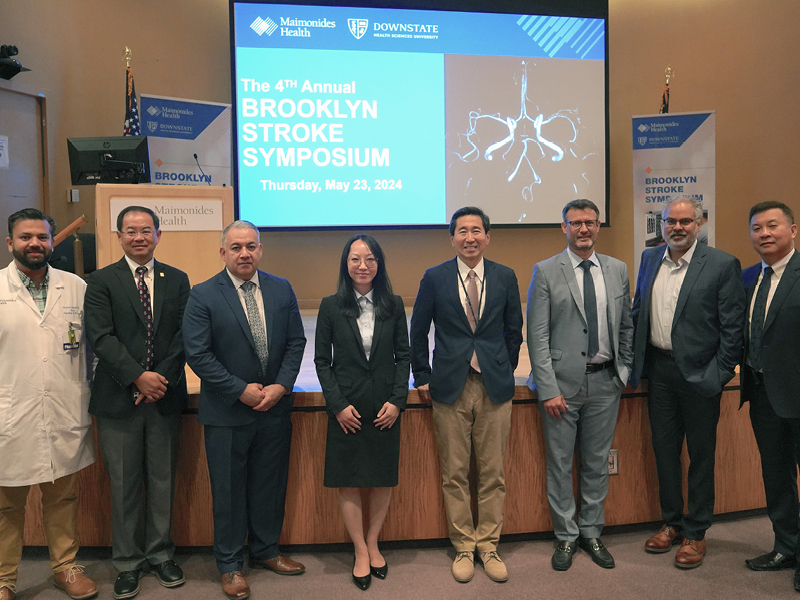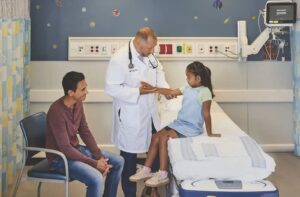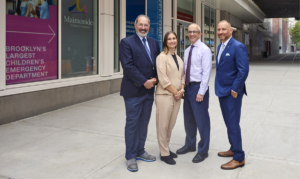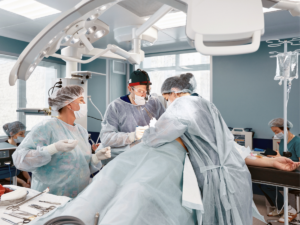The Jaffe Comprehensive Stroke Center at Maimonides and SUNY Downstate Health Sciences University Department of Neurology convened the 4th Annual Brooklyn Stroke Symposium on Thursday, May 23, 2024. The day was dedicated to updating stroke specialists and related healthcare professionals on the latest clinical advancements in stroke management and groundbreaking research.
Nearly 400 physicians, nurses, nurse practitioners, physician assistants and first responders attended the full-day, in-person and virtual CME event. Discussions centered on recent progress and breakthroughs in individualized and evidence-based clinical stroke care.
“Maimonides is known for its tradition of clinical excellence in stroke care,” said Q. Tony Wang, MD, PhD, Program Director at the Jaffe Comprehensive Stroke Center at Maimonides. “Our multidisciplinary expert clinical teams treat a wide array of stroke patients including some of the most complex and challenging cases. We carry out sophisticated, state-of-the-art procedures and individualized pharmaceutical therapy to improve stroke patient’s outcomes and survival. There is close collaboration between our stroke program and other specialties including Neurosurgery, Neuroradiology, Neurocritical Care, Emergency Medicine, Cardiology & Cardiothoracic Surgery, and Rehabilitation, along with SUNY Downstate and Maimonides Midwood Community Hospital.”
Innovation in Stroke Care
Several Maimonides experts led sessions, including Dr. Wang, Daniel Rosenbaum, MD, Regional Chair of Neurology, Ainie Soetanto, MD, Neurology Residency Associate Program Director, Robert Rhee, MD, Chief of Vascular and Endovascular Surgery, and Gregory Crooke, MD, Cardiothoracic Surgeon and Co-Director of Maimonides LVAD Program and Surgical Director of the TAVR Program.
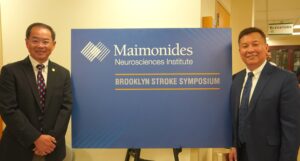
David Wang, MD, Co-Director of the Petznick Stroke Center at Barrow Neurological Institute, and Q. Tony Wang, MD, Program Director at the Jaffe Comprehensive Stroke Center at Maimonides.
“Much of the symposium’s focus this year tackled controversial topics like cerebral arteriovenous malformations (AVM), mycotic aneurysms, and challenging carotid access for stroke treatment and prevention,” Dr. Wang said. “We also discussed some of the leading-edge clinical research, including investigations into biomarker discoveries, neuroregeneration, and neuromodulation for neurorehabilitation.”
Sharing these developments is critical, he says, because it expands existing knowledge around stroke prevention and treatment using the most advanced surgical and pharmacological therapies. As a result, stroke specialists will be better prepared to deliver individualized treatments to patients who experience stroke symptoms.
Promoting Research
The conference featured research-focused sessions where internationally renowned speakers presented their latest findings, progress, and challenges. Through collaboration with Alison Baird, MD, PhD, Professor of Neurology, Physiology and Pharmacology at SUNY Downstate, Maimonides’ stroke program has focused some of its research on the search for a point-of-care (POC) stroke biomarker that could be readily used at the bedside for stroke patient identification, like troponin as a rapid biomarker for heart attack.
“We’re concentrating on the concept for a biomarker — a way to confirm a stroke through a blood test,” Dr. Wang said. “By developing a quick 15-minute turnaround test besides currently available imaging technologies and clinical assessments, we can impact our ability to intervene to treat stroke early.”
Additionally, Dr. Crooke presented details about surgical strategies and techniques to manage refractory and symptomatic infective endocarditis.
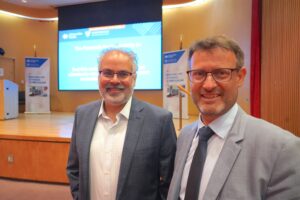
Aman Patel, MD, of Massachusetts General Hospital, and Raphael Guzman, MD, of Switzerland’s University Hospital Basel, spoke at the 2024 Brooklyn Stroke Symposium.
The symposium also showcased findings from leaders of top stroke care centers around the United States and the globe. From Duke University Hospital, Wayne Feng, MD, Chief of Division of Stroke & Vascular Neurology, Medical Director of Duke Comprehensive Stroke Center, presented on the use of neuromodulation tools for stroke recovery, acute treatment, and prevention. Aman Patel, MD, a dual-trained open and endovascular neurosurgeon, Vice Chair of Neurosurgery and the Program Director of Cerebrovascular Neurosurgery at Harvard’s Massachusetts General Hospital, highlighted the management considerations and controversies of patients with cerebral arteriovenous malformation (AVM) post ARUBA trial. David Wang, DO, Co-Director of the Petznick Stroke Center, Professor of Neurology and Interim Director of Stroke Fellowship at Barrow Neurological Institute, highlighted the complexity of atrial fibrillation-related stroke prevention including anticoagulation and its alternatives such as left atrial appendage closure/clipping.
From Switzerland’s University Hospital Basel, Raphael Guzman, MD, Professor of Neurosurgery and Chairman of the Department of Neurosurgery, presented his 20 years’ research work on stem cell-mediated regeneration and neuroprotection in stroke.
Building Partnerships
While clinical advancements and groundbreaking research are critical to improving stroke care, it’s equally vital to promote collaborative efforts, Dr. Wang said. This year’s symposium aimed to highlight the need for existing and burgeoning partnerships.
“It’s important for providers in the community to recognize that we’re able to deliver the best individualized stroke care through a multidisciplinary approach,” he said. “It’s through communication, shared use of technology and knowledge that we learn how to integrate our systems. The pursuit of excellence in this endeavor is what drives us forward at the leading edge.”
This type of teamwork is critical because patients experiencing stroke can be complex. They have different dietary, environmental and genetic risk factors that vary across populations. Consequently, multidisciplinary teams of stroke specialists must know how to work together to meet their needs.
Leveraging Expertise
“Maimonides is uniquely positioned to host this symposium,” Dr. Wang says. In 2004, the hospital became Brooklyn’s first primary stroke center. Then, in 2017 it became the area’s second Comprehensive Stroke Center and was re-certified as a Comprehensive Stroke Center by The Joint Commission last year.
The Maimonides stroke team comprises stroke experts, mid-level advanced practice providers, and neurology residents. This group is available 24/7 to deliver high-quality, comprehensive and efficient care to treat ischemic and hemorrhagic stroke, as well as transient ischemic attacks.
As a result of this dedicated work, the Stroke Center has earned the American Heart Association’s Get With The Guidelines Gold Plus Honor Roll for 15 years in a row and is currently tracking towards the 2024 Gold Plus Award with Target: Stroke Elite Plus, Target: Stroke Advanced Therapy, and Diabetes Honor Roll. In 2022/23 and 2023/24, U.S. News and World Report ranked Maimonides as a “Best Regional Hospital” and High Performing for Stroke Care.
“We have a multilingual and multicultural team in our Stroke Center that is unique in a variety of ways. We lead Brooklyn as the largest hospital and the one with the highest level of stroke program in terms of efficiency, complexity, and volume,” Dr. Wang said. “We are gratified to host the Brooklyn Stroke Symposium with SUNY Downstate, and see it continue to grow each year.”
Learn more about stroke care at Jaffe Comprehensive Stroke Center at Maimonides or call (718) 283-7670 for an appointment or to refer.

